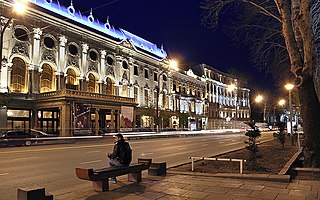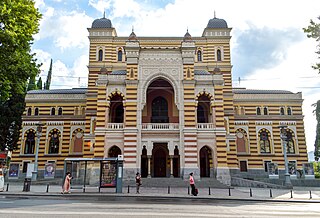
Tbilisi, in some languages still known by its pre-1936 name Tiflis, is the capital and the largest city of Georgia, lying on the banks of the Kura River with a population of approximately 1.5 million people. Tbilisi was founded in the 5th century AD by Vakhtang I of Iberia, and since then has served as the capital of various Georgian kingdoms and republics. Between 1801 and 1917, then part of the Russian Empire, Tiflis was the seat of the Caucasus Viceroyalty, governing both the northern and the southern parts of the Caucasus.

Shota Rustaveli, mononymously known simply as Rustaveli, was a medieval Georgian poet. He is considered to be the pre-eminent poet of the Georgian Golden Age and one of the greatest contributors to Georgian literature. Rustaveli was the author of The Knight in the Panther's Skin, which is considered to be a Georgian national epic poem.

Didube is a metro station in Tbilisi, Georgia. It is located on the Akhmeteli–Varketili Line. Didube is three stations from the central station, and five from the city's main street, in between Gotsiridze and Grmagele stations. The station is above ground.

The April 9 tragedy refers to the events in Tbilisi, Georgian Soviet Socialist Republic, on April 9, 1989, when an anti-Soviet, pro-independence demonstration was brutally crushed by the Soviet Army, resulting in 21 deaths and hundreds of injuries. April 9 is now remembered as the Day of National Unity, an annual public holiday.

Rustaveli Avenue, formerly known as Golovin Street, is the central avenue in Tbilisi named after the medieval Georgian poet, Shota Rustaveli.

Freedom Square is located in the center of Tbilisi, Georgia at the eastern end of Rustaveli Avenue..

Rustaveli National Theatre is the largest and one of the oldest theaters of Georgia, located in its capital Tbilisi on Rustaveli Avenue. Housed in an ornate Rococo-style edifice, the theatre was founded in 1887 and since 1921 has carried the name of Georgia's national poet Rustaveli.

The Georgian National Opera and Ballet Theater of Tbilisi, formerly known as the Tiflis Imperial Theater, is an opera house situated on Rustaveli Avenue in Tbilisi, Georgia. Founded in 1851, Tbilisi Opera is the main opera house of Georgia and one of the oldest such establishments in Eastern Europe and Western Asia.

The Tbilisi Marriott Hotel is a luxury five-star Marriott hotel in Tbilisi, Georgia, located in 13 Rustaveli Avenue, the city's main boulevard. It was built as a high-class hotel on the commission of the wealthy Armenian merchant Mikael Aramyants from 1911 to 1915.

David Aghmashenebeli Avenue is one of the main avenues in the historical part of Tbilisi, known for its 19th-century classical architecture. The avenue is located on the left bank of the Kura River and runs from Saarbrücken Square to Giorgi Tsabadze street.

Rustaveli is a station of the Tbilisi Metro on the Akhmeteli–Varketili Line. It is located at Rustaveli square at the northern end of Rustaveli Avenue. The station was opened on 11 January 1966 as part of the first metro line with six stations from Didube to Rustaveli. Located between Tavisuplebis Moedani station and Marjanishvili station, Rustaveli is 60 metres underground the deepest station of the Tbilisi metro system.

Tavisuplebis Moedani is a station of the Tbilisi Metro on the Akhmeteli–Varketili Line. It is located close to Freedom Square at the southern end of Rustaveli avenue. The station was opened on 6 November 1967 as an extension of the original Rustaveli–Didube line. The station was renovated in 2006.

The Rustaveli Cinema is a movie theater in Tbilisi. The theater is on Rustaveli Avenue opposite the Parliament of Georgia. The theater was opened in 1939 and had originally a seating capacity of 1200 people. It was designed by the architect Nikolay Severov in the style of Stalinist architecture, and has sculptures by Valentin Topuridze and Shota Mikatadze representing different social groups in vaulted niches at the second floor level. The building has four floors and is a cuboid. The first floor is rusticated whereas the upper floors are structured by Corinthian pilasters. The top of the building is rendered as an overhanging cornice. In 1999 the Rustaveli cinema was renovated and reopened on 11 July 1999 with 415 seats. It shows mostly first-run blockbuster films and has on average 1000 visitors per day.

The Tbilisi State Academy of Arts is one of the oldest universities in Georgia and Caucasus. It is located in Tbilisi city near the Tbilisi Opera and Ballet Theatre on Rustaveli avenue.

TheBiltmore Hotel Tbilisi is a luxury hotel in Tbilisi, the capital of Georgia, operated by the Millennium & Copthorne Hotels. The Biltmore Hotel Tbilisi is the first Biltmore outside of the United States and first hotel in the newly presented upscale luxury Biltmore Collection of the Millennium & Copthorne Hotels. The Grand Opening ceremony took place on July 31, 2016. Located on Rustaveli Avenue, the city's main thoroughfare, the hotel occupies the historical Soviet-era building IMELI, constructed in the 1930s, and a 32-floor skyscraper, built in the 2010s. Remaking of the old building as well as erection of the new one was heavily criticized by preservationists.

The Parliament of Georgia Building is the meeting place of the Parliament of Georgia, located in Tbilisi, the capital of Georgia. It is located in 8 Rustaveli Avenue, close to the foothills of Mount Mtatsminda.

The Tbilisi Art Gallery, or the National Gallery is an art gallery located on Rustaveli Avenue in Tbilisi. Historically, it is known to Tbilisians as the Blue Gallery, taking its name from the various shades of the blue-green paint previously adorning the facade, although the building is now painted grey.


















